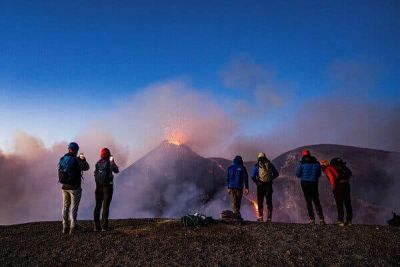Local agencies continue to monitor eruptions of Sicily’s Mount Etna and Mount Stromboli. Catania Airport was closed because of the potential risks from ash in the atmosphere from Mount Etna. One of Europe's most active volcanoes, Etna began erupting in June sending lava flows down the 3,320-meter high cone on the Italian island of Sicily. "The runway at Catania Airport is unusable due to the volcanic ash fall. Both arrivals and departures are suspended," the airport said in a statement. Flights since resumed, although some restrictions in services remained in place. The eruption prompted Italy's Civil Protection agency to raise its alert level for the area from green to yellow. Italy's Civil Protection Department warned that this is not a one-off event. "Italy, together with Iceland, has the greatest concentration of active volcanoes in Europe and is one of the first in the world for the number of inhabitants exposed to volcanic risk," they said in a statement, "Active or potentially active volcanoes are situated in southern Italy with varying degrees of hazard." The department also advised locals and tourists alike to "follow the civil protection authorities’ instructions transmitted by radio, TV, in the daily press, on the internet and by the various toll-free numbers that will be set up." On the nearby island of Stromboli, the Civil Protection Agency issued its top, red alert warning the situation there could deteriorate. The volcano there also started erupting in June, sending ash clouds two kilometers into the sky and spilling lava into the sea. "…Stromboli has been under special surveillance with greater attention because of the red level, so the maximum scale of attention," said Fabrizio Curcio, Head of the Civil Protection Department in Italy. “An information campaign has been carried out for citizens and obviously there is a reinforced scientific monitoring system."
I governi locali in Sicilia continuano a monitorare le eruzioni vulcaniche dell'Etna e del Monte Stromboli. L'Etna è uno dei vulcani più attivi al mondo. L'eruzione di giugno ha eruttato la lava alto 3.320 metri. L'aeroporto di Catania è stato chiuso perché il rischio potenziale di cenere per i voli era enorme. I voli in partenza e in arrivo sono stati sospesi per un certo periodo. Ora i voli sono ricominciati con restrizioni. L'eruzione ha spinto le agenzie governative a modificare il livello di sicurezza per i residenti da verde a giallo, specialmente perché l'Etna potrebbe eruttare di nuovo. L’Italia e l’Islanda hanno i vulcani più attivi di tutta Europa. Sono gli unici due paesi al mondo in cui i residenti devono essere sempre vigili in caso di eruzione. I vulcani attivi si trovano nel sud Italia. Le autorità locali avvertono che i residenti vicino ai vulcani seguono le informazioni trasmesse dalla radio, dalla TV, dai giornali o da Internet. Ci sono anche numeri telefonici solo per ricevere informazioni di emergenza. Sull'isola di Stromboli, l’allerta di sicurezza è al livello più alto, rossa. Anche il vulcano dell'isola ha eruttato a giugno e le nuvole di cenere si sono alzate per almeno due chilometri nel cielo. Anche la lava scorreva sul mare. Secondo Fabrizio Curcio, capo della Protezione civile italiana, i governi locali sono molto preoccupate per i residenti di Stromboli perché il livello di sicurezza è ai massimi livelli. Esiste un programma creato per allertare i residenti con informazioni attuali e hanno anche creato una varietà di sistemi scientifici per monitorare la situazione.



